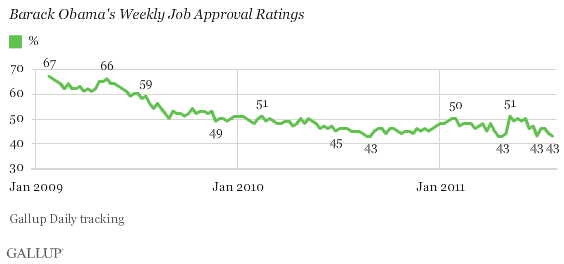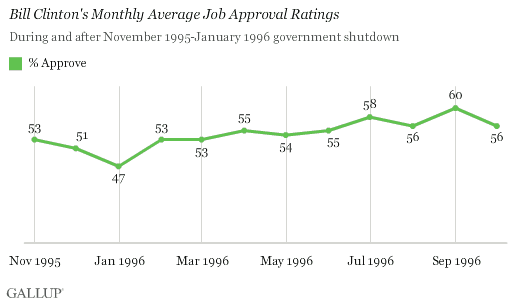PRINCETON, NJ -- President Barack Obama averaged a 43% job approval rating for the week of July 18-24, tied for the lowest weekly average of his administration. Obama's rating at this point is lower than President Bill Clinton's ratings were in the fall of 1995 when he was embroiled in a budget dispute similar to the one Obama faces now.

Obama's most recent weekly job approval rating is similar to his 44% of the previous week, but down three percentage points from the two weeks before that. The president also had 43% weekly job approval ratings in late June, in April, and in August 2010. His three-day job approval average for the weekend, July 22-24, is 45%, up slightly from 42% for July 21-23.
The trajectory of Obama's approval ratings going forward will depend partly on the way the current high-stakes, high-visibility negotiations over the federal budget and deficit play out in the weeks ahead. Obama spent last week working with Speaker of the House John Boehner and others to reach agreement on lifting the nation's debt ceiling by Aug. 2. By the weekend, the negotiations were at an impasse, and Obama was left without an agreement on the big budget deal he had been pursuing.
Obama's current job approval rating is now lower than President Bill Clinton's was in November and December 2005, when Clinton faced off against Speaker of the House Newt Gingrich over a budget dispute, resulting in a federal government shutdown that had some similarities to the present crisis. Clinton's monthly job approval average was 53% and 51% in November and December of that year, respectively, before falling back slightly in January to 47% around the time the conflict was resolved. Clinton's approval rating then registered above 50% for the remaining nine months before the November 1996 election in which he won a second term by defeating Republican Bob Dole.

Gallup does not track approval ratings for Congress or for specific congressional leaders on a daily or weekly basis, so it is difficult to pinpoint how Obama is faring compared with the individuals with whom he has been negotiating. Gallup's July 15-17 survey found that approval ratings for both the Republicans and the Democrats in Congress were around 30% -- unchanged from the previous readings, but clearly below Obama's job approval ratings then or now.
Implications
The long-term implications of the current debt ceiling crisis in Washington won't be known until after a budget agreement is ultimately reached -- and after the inevitable spin and posturing that will ensue. President Obama is in a somewhat more perilous situation now, based on his job approval ratings, than was President Clinton in late 1995, when Clinton faced off against Gingrich over similar budget issues. Clinton's job approval rating was above 50% during most of the shutdown, and continued at that level from February 1996 through the November election, which he won. Obama's job approval ratings in recent weeks have been significantly lower.
Explore President Obama's approval ratings in depth and compare them with those of past presidents in the Gallup Presidential Job Approval Center.
Survey Methods
Results are based on telephone interviews conducted as part of Gallup Daily tracking July 18-24, 2011, with a random sample of 3,577, aged 18 and older, living in all 50 U.S. states and the District of Columbia.
For results based on the total sample of national adults, one can say with 95% confidence that the maximum margin of sampling error is ±2 percentage points.
Interviews are conducted with respondents on landline telephones and cellular phones, with interviews conducted in Spanish for respondents who are primarily Spanish-speaking. Each sample includes a minimum quota of 400 cell phone respondents and 600 landline respondents per 1,000 national adults, with additional minimum quotas among landline respondents for gender within region. Landline telephone numbers are chosen at random among listed telephone numbers. Cell phone numbers are selected using random-digit-dial methods. Landline respondents are chosen at random within each household on the basis of which member had the most recent birthday.
Samples are weighted by gender, age, race, Hispanic ethnicity, education, region, adults in the household, and phone status (cell phone only/landline only/both, cell phone mostly, and having an unlisted landline number). Demographic weighting targets are based on the March 2010 Current Population Survey figures for the aged 18 and older non-institutionalized population living in U.S. telephone households. All reported margins of sampling error include the computed design effects for weighting and sample design.
In addition to sampling error, question wording and practical difficulties in conducting surveys can introduce error or bias into the findings of public opinion polls.
For more details on Gallup's polling methodology, visit www.gallup.com.
